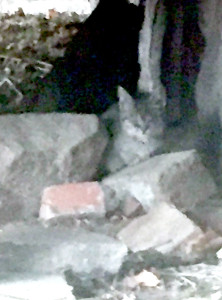By Susan Bromley
Staff Writer
Tammy Beal received a desperate call for help the day after Thanksgiving.
A woman who had just received the keys to move into her newly purchased 1892 farmhouse in Davison arrived to find the previous owner had left behind a note asking her to feed the cats. On the porch were several makeshift cat houses, including one in which a kitten lay on its dead mother.
Beal was soon on her way—literally to the rescue—and was greeted with hugs and relief, although she quickly explained she would not be keeping all of the animals. She would eventually trap about 15 cats and kittens at the property.The adult cats were feral, and likely not adoptable. The best option would be to find homes for the kittens, and trap, release, and return the adult cats to the only home they had known— the Davison property which had a barn to shelter the feral animals.
Beal has been doing TNR, for the past six or seven years, and the fairly new way of controlling the pet population is working, reducing the number of animals that are euthanized by Genesee County Animal Control, where she first started her volunteer efforts as a dog walker.
“When I started (volunteering at animal control), the kill rate for dogs was 60 percent and the kill rate for cats was 97 percent,” said Beal, a Grand Blanc resident. “I wanted to see what I could do… Now we are as close to no kill as we can get.”
The Humane Society of the United States supports TNR as a means to control the community cat (feral or stray) population.
Accordingto www.humanesociety.org,
there are 30 to 40 million feral or stray cats in the United States and only 2 percent of these have been spayed or neutered. As a result, these cats produce around 80 percent of the kittens born in the U.S. each year.
There is currently not a TNR program in place in Genesee County. For the last few years, Beal has trapped cats in both Genesee and Oakland counties and taken 20 at a time to the Michigan Humane Society in Detroit to have them spayed or neutered. However, that program is being discontinued as it is not cost effective. Instead, MHS will continue to do two free spay and neuter for feral cats per day. But that is not cost or time effective for Beal, a Grand Blanc resident, who is taking feral cats to Warren or Fenton for rescues that offer spay and neuter at $25 per cat. She and the rescues that are dedicated to showing compassion for the animals and reducing overpopulation struggle to find funding.
“People do not want to pay for ‘nobody’s cats’ to get fixed,” said Beal. “We have the term ‘nobody’s cat’ because nobody want to fix nobody’s cat.”
Beal knows, however, that what she does makes a difference— both in reducing the number of feral cats, and making a better life for the ones that are out there. She recalls the woman who called her crying after seeing a feral cat on her property with a plastic jar stuck on its head from which it had tried to obtain water. The animal hadn’t been able to eat in two days. Beal trapped it and in the cat’s fear of being touched, it finally knocked the jar off its face.
“These cats are everywhere,” said Beal. “Garages, sheds, barns. I get a call at least once a week— ‘We have a feral cat population that needs to be fixed.’”
She has tried to stay in Genesee County to help the cats, but has gone as far as Homer, near Battle Creek, to a trailer park in middle of a cornfield, where it was reported that kids were poking things in the eyes of feral cats, dumping paint on them, gluing their anuses shut, and one cat was burned. She and her fellow volunteers took 43 cats and kittens out of that trailer park. But in most instances, once feral cats have been spayed or neutered, they are returned to the location where they were found.
“They need to go back to their home, where they are king of their kingdom, they know where safety is, where to hide from prey, where to stay warm,” said Beal, who traps at least 100 feral cats in the summer and estimates she has assisted in the TNR of 3,000 in the last five years.
The call for help in Davison resulted in Beal fostering two 12-week-old kittens and two 7-week-old kittens. Another rescue took in two more 7-week-old kittens from the Davison house and in total, 7 adult cats were trapped, two of which had to be euthanized because of sickness, but five of which were neutered or spayed and returned to the Davison property, where straw and food have been provided. The kittens are being treated for infections and parasites and are also being socialized. They will be made available for adoption.
Beal hopes that people who see stray cats or dogs will show compassion for the animals.
“You don’t have to bring it in and make it part of your family, but take care of it,” said Beal. “We’re all human and can love or not love animals, but at least put a bowl of food out. If you want your kids to be caring adults, they have to learn from you.”
You can make a difference in the fight against pet overpopulation and support Beal’s TNR mission by making a donation. Checks can be made payable to the Devoted Friends Animal Society, a non-profit organization. Send to 600 Timber Hill Drive, Ortonville, MI 48462. In the memo write “Tammy’s Ferals.” The money will be used for the spay/neuter fee and for items to help care for feral cats. Paypal donations can also be accepted at dfas.rescue@gmail.com. For more information, email tambeal04@yahoo.com or like Tammy Beal on Facebook.
